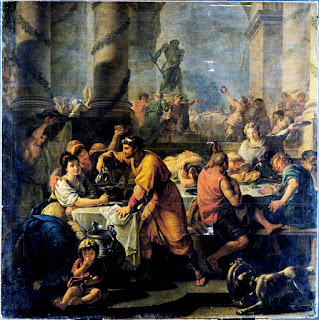First observed in the Roman Empire on this day in 497 BC and over the centuries expanded into a six-day feast ending on 23 December, Saturnalia was held in honour of the god Saturn with public banquets, role-
reversals, continual revelry and private gift-exchanges—usually in the form of white elephant presents, wax or pottery statuettes (action figures, see also) of the divine called sigillaria. Theologically important for some Romans who saw the festive time as a revival of the Golden Age (just as some classicists and successor nations see the Romans), traditions heavily references its Athenian equivalent, called Kronia (Κρόνια—for Chronos), when the gods ruled the world and toil and class was unknown, though not anticipating the solstice and the gradual return of the sun after a break, dark winter, Kronia was held ahead of the first harvest in July, August during the first month of the Greek calendar beginning in the summer, Hekatombaiōn. Rumours of human sacrifice to appease Saturn were greatly exaggerated and like spread by Christian apologist (see above).
skip to main |
skip to sidebar
pages
this week’s popular posts
-
Having recently revisited the designation of the Anthropocene Age in the midst of the COP30 climate summit and we enjoyed this alter...
-
Though many fall after the period of the Soviet calendar, which was in use along side traditional ones from 1918 to 1940 ( see previously...
-
climate change is no longer a threat of the future—it is a tragedy of the present : COP30 opens in Belém at the edge of the Amazon rainfor...
-
The US supreme court unanimously rejected a bid to reverse its 2015 landmark decision on the case Obergefell v Hodges , turning away an a...
-
Via two of our favourite bloggers, Nag on the Lake and Everlasting Blört , we are directed towards the exacting model that Luke Jerram and...
-
Though the authenticity and authorship of the received gospel of the witches studied and published US folklorist and journalist Charles G...
-
Following Sunday night’s vote in the senate which saw eight political safe Democrats side with Republicans to overcome the filibuster th...
-
The Philadelphia Mint struck its last batch of pennies today after issuing the one cent coins continually since 1793 after Trump declare...
-
Courtesy of MetaFilter , we are introduced to the musical stylings of one Ecca Vandal, singer-songwriter hailing from Melbourne of South ...
-
Via Web Curios , we quite enjoyed this five unit crash course whose simple yet atrophied syllabus is aimed at teaching those who want to...
📐
🇩🇪
🎶
🎓
🇺🇸
🌐
💬
🇬🇧
ⓦ
🧠
🎬
👥
⚖️
📚
💡
📺
📅
💱
🌍
⚕
🔭
🇫🇷
🥸
🎨
💼
🤖
🌱
💭
🇮🇹
🗞
✝️
📷
🧳
🇯🇵
⛓️💥
🏷️
🇷🇺
lifestyle
🌏
🏌️
environment
🗺
🇪🇺
🔣
myth and monsters
libraries and museums
architecture
🧮
🌡
⚛️
🚘
🇨🇦
🇬🇷
🌎
📔
🏺
Star Wars
🎙
🇨🇳
🏰
👾
🇨🇭
🖖
💾
🌪
💧
🎄
🎭
🇳🇱
🗳️
🚋
🏳️🌈
🕳️
Hessen
networking and blogging
🧲
✈️
holidays and observances
Bavaria
religion
🇹🇷
🏕
🇸🇪
🧬
🇳🇴
😈
🗽
🇺🇦
🧶
food and drink
🇮🇸
transportation
🌳
Rhön
🚢
🇦🇹
🛡️
🥂
🇨🇿
🇲🇽
🇮🇪
🌙
⚰️
🇪🇸
🍻
🏛
🛸
🔎
🛂
🍔
🎃
🧀
🪆
The Simpsons
Saxony
🇧🇪
🌉
📱
🪶
😺
Thüringen
1969
1968
1973
☦️
1972
Mars
🎲
1971
sport and games
📯
🛋
1970
1975
🇻🇦
🐝
👻
🃏
🇵🇱
🐾
1974
🇩🇰
🎛
🧿
🇵🇸
💂♂️
🧱
🇭🇷
👨🎤
🍹
🔮
🧪
Rheinland-Pfalz
🍽
1961
Kubrick
🇫🇮
🍞
💌
1981
1984
⚒
🍄
🍷
Dune
🔥
1985
🏴
🚌
♻️
🍕
🎢
🧜♂️
1983
1999
⚠️
🇺🇳
🇵🇹
🏢
🐣
🕌
1982
🖼
🦸
1980
🌋
🥾
🛒
1989
✡️
🚲
♞
🐴
🛍️
🤸♀️
1990
🇬🇱
🍂
🏴☠️
Tolkien
🤸
1987
🎺
🏗️
🏳️⚧️
1976
1978
🩰
🇰🇷
🍝
1991
Baden-Württemberg
♏
🇭🇰
🇭🇺
🧛♂️
1977
🎹
🥤
1992
🇮🇷
💂
🥃
🥣
🦃
🇸🇾
🇻🇳
💄
1979
2001
🇪🇬
🇰🇵
🐳
🦋
Mecklenburg-Vorpommern
☕
🇪🇪
🇹🇼
💂♀️
🕉️
🕺
🪨
🇳🇿
🌵
🍫
🐑
🦈
🦕
🪸
1967
1986
🇦🇺
🇨🇺
🇮🇶
🦢
1993
Blade Runner
🇸🇰
⛅️
🌤
🇮🇳
🏌️♂️
🦑
🇮🇲
🦅
🪐
1988
🧟
1994
2003
🇸🇦
🐌
2000
⚽
🇦🇪
🇱🇾
🇸🇬
🇸🇮
🏖
💈
🛼
🦆
🦒
⚾️
🇦🇲
🇨🇾
🇲🇹
🦇
🇦🇫
🇧🇷
🇬🇪
🇵🇦
🕸️
🛗
2004
🇲🇳
🎾
1996
1997
1995
1998
🇱🇺
🛵
🇦🇱
🇦🇷
🇨🇩
🇱🇧
🇲🇩
🇲🇴
🇵🇰
🦚
🇯🇲
🇯🇴
🇱🇻
🇲🇨
🎳
🐬
2002
Brandenburg
⛸
🇦🇩
🇧🇬
🇨🇱
🇸🇲
🇱🇮
🇳🇵
🇶🇦
🇹🇳
🇻🇪
🇿🇦
🇱🇰
🏈
🤸♂️
🇧🇧
🇭🇹
2012
🇧🇲
🇬🇩
🇰🇳
🇱🇹
🇷🇴
🇹🇨
🇹🇭
🇻🇮
🕯
2005
🇧🇸
🇨🇲
🇨🇴
🇰🇭
🇰🇾
🇱🇸
🇳🇬
🇵🇪
🇸🇽
🇹🇹
🇻🇬
🇾🇪











